小学英语反意疑问句教案
《反义疑问句》优秀教案
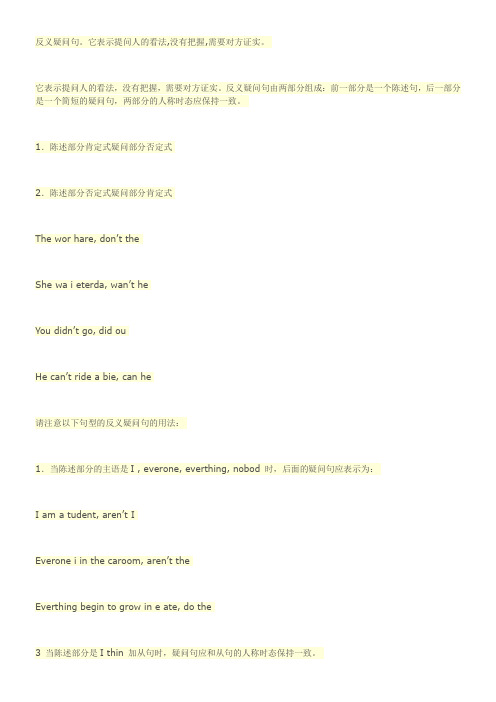
反义疑问句。
它表示提问人的看法,没有把握,需要对方证实。
它表示提问人的看法,没有把握,需要对方证实。
反义疑问句由两部分组成:前一部分是一个陈述句,后一部分是一个简短的疑问句,两部分的人称时态应保持一致。
1.陈述部分肯定式疑问部分否定式2.陈述部分否定式疑问部分肯定式The wor hare, don’t theShe wa i eterda, wan’t heYou didn’t go, did ouHe can’t ride a bie, can he请注意以下句型的反义疑问句的用法:1.当陈述部分的主语是I , everone, everthing, nobod 时,后面的疑问句应表示为:I am a tudent, aren’t IEverone i in the caroom, aren’t theEverthing begin to grow in e ate, do the3 当陈述部分是I thin 加从句时,疑问句应和从句的人称时态保持一致。
I thin chicen can wim, can’t theI thin Luc i a good gir, in’t heI didn't thin he wa ha, wa he4 陈述部分有had better 时,疑问句应用hadn’t开头:ou’d better get u ear, hadn’t ou5当陈述部分是祈使句时,疑问句要根据语气来表达Let’ go out for a wa, ha weLet u go our for a wa, wi ouTurn on the radio, wi ou,no,但是,当陈述部分是否定形式时,回答要按事实。
如:The don’t wor hard, do the 他们不太努力工作,是吗?Ye, the do 不,他们工作努力。
/No, the don’t 对,他们工作不努力。
反意疑问句教学案
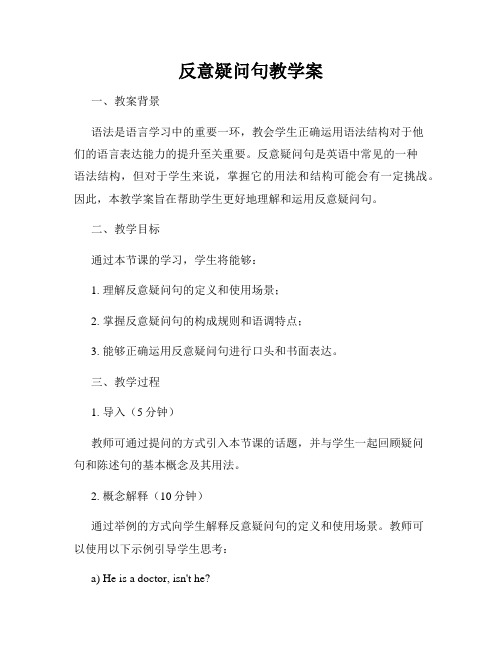
反意疑问句教学案一、教案背景语法是语言学习中的重要一环,教会学生正确运用语法结构对于他们的语言表达能力的提升至关重要。
反意疑问句是英语中常见的一种语法结构,但对于学生来说,掌握它的用法和结构可能会有一定挑战。
因此,本教学案旨在帮助学生更好地理解和运用反意疑问句。
二、教学目标通过本节课的学习,学生将能够:1. 理解反意疑问句的定义和使用场景;2. 掌握反意疑问句的构成规则和语调特点;3. 能够正确运用反意疑问句进行口头和书面表达。
三、教学过程1. 导入(5分钟)教师可通过提问的方式引入本节课的话题,并与学生一起回顾疑问句和陈述句的基本概念及其用法。
2. 概念解释(10分钟)通过举例的方式向学生解释反意疑问句的定义和使用场景。
教师可以使用以下示例引导学生思考:a) He is a doctor, isn't he?b) You don't like ice cream, do you?解释后,教师可以与学生一起总结反意疑问句的特点,如陈述部分和疑问部分之间存在反义关系,并且疑问部分以短语的形式出现。
3. 构成规则(15分钟)教师可通过提供一些常见的反意疑问句构成规则来帮助学生理解并掌握其结构。
例如:a) 对陈述句部分的形式,疑问部分使用反义疑问词(auxiliary verb)加否定词或肯定词;b) 如果陈述句部分为肯定形式,则疑问部分使用否定词形式;c) 如果陈述句部分为否定形式,则疑问部分使用肯定词形式。
4. 语调特点(10分钟)教师可以通过演示和模仿的方式帮助学生正确掌握反意疑问句的语调特点。
例如,教师可以提问学生问题,并引导他们模仿正确的语调回答。
教师需要强调语调的上扬和下降,以及肯定和否定的区别。
5. 练习活动(15分钟)教师可设计一些练习活动,让学生进行实际操作。
例如,教师可以提供一些句子,要求学生根据规则构成相应的反意疑问句,并在口头上进行练习。
6. 拓展讨论(10分钟)教师可引导学生思考反意疑问句的其他使用场景,并鼓励他们在日常交流中积极应用这一语法结构。
反义疑问句教案

反义疑问句教案反义疑问句是一种特殊的疑问句形式,用于提出事实陈述并征求对方的确认或否定。
它由一个肯定或否定的陈述句和一个反义疑问句构成。
在反义疑问句中,陈述部分的形容词、副词或助动词与疑问部分相反。
以下是一份反义疑问句教案,帮助学生理解和使用这种疑问句形式:教学目标:1. 学习和理解反义疑问句的概念和结构。
2. 能够正确使用反义疑问句进行交流。
教学步骤:步骤1:引入反义疑问句向学生解释反义疑问句的概念和结构,并给出一些例子,如: You are a student, aren't you?She doesn't like coffee, does she?He can swim, can't he?步骤2:解析反义疑问句的结构让学生注意到反义疑问句的结构:陈述部分肯定,疑问部分否定(或反之亦然)。
提醒他们注意主语、助动词的变化。
步骤3:练习使用反义疑问句让学生练习使用反义疑问句。
可以使用以下练习:- 给出陈述句,让学生转化为反义疑问句。
- 给出反义疑问句,让学生写出相应的陈述句。
- 学生之间进行对话练习,使用反义疑问句进行询问和确认。
步骤4:练习口语应用安排学生进行角色扮演对话,其中包括使用反义疑问句。
例如,两个学生扮演朋友,在询问对方喜欢或不喜欢某种食物或活动时使用反义疑问句。
步骤5:总结和评估回顾所学的内容,确保学生对反义疑问句的使用和结构有一定的理解。
可以进行简短的测验或问答来评估学生的学习成果。
通过这样的教学过程,学生将能够理解和正确使用反义疑问句。
这种疑问句形式在日常交流中非常常见,并且能够增加对话的流畅性和准确性。
教案表反意疑问句
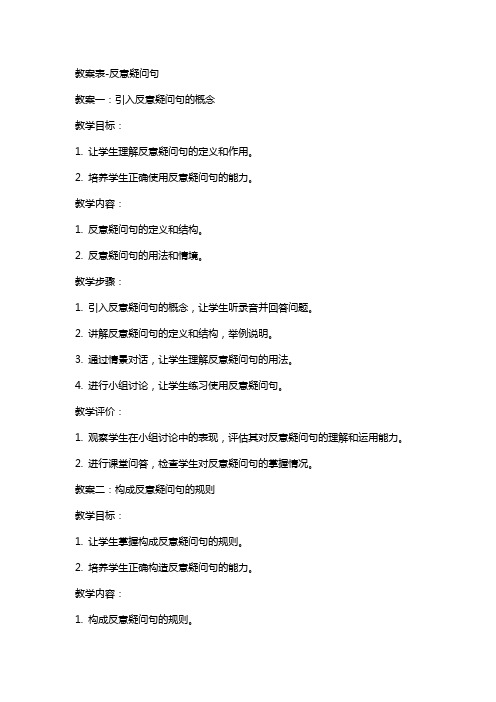
教案表-反意疑问句教案一:引入反意疑问句的概念教学目标:1. 让学生理解反意疑问句的定义和作用。
2. 培养学生正确使用反意疑问句的能力。
教学内容:1. 反意疑问句的定义和结构。
2. 反意疑问句的用法和情境。
教学步骤:1. 引入反意疑问句的概念,让学生听录音并回答问题。
2. 讲解反意疑问句的定义和结构,举例说明。
3. 通过情景对话,让学生理解反意疑问句的用法。
4. 进行小组讨论,让学生练习使用反意疑问句。
教学评价:1. 观察学生在小组讨论中的表现,评估其对反意疑问句的理解和运用能力。
2. 进行课堂问答,检查学生对反意疑问句的掌握情况。
教案二:构成反意疑问句的规则教学目标:1. 让学生掌握构成反意疑问句的规则。
2. 培养学生正确构造反意疑问句的能力。
教学内容:1. 构成反意疑问句的规则。
2. 反意疑问句的例子和练习。
教学步骤:1. 讲解构成反意疑问句的规则,包括主语、助动词、情态动词等。
2. 通过例子和练习,让学生理解和掌握规则。
3. 进行小组讨论,让学生练习构造反意疑问句。
教学评价:1. 观察学生在小组讨论中的表现,评估其对反意疑问句规则的理解和运用能力。
2. 进行课堂问答,检查学生对反意疑问句的构造能力。
教案三:使用反意疑问句的时机教学目标:1. 让学生了解使用反意疑问句的时机。
2. 培养学生正确运用反意疑问句的能力。
教学内容:1. 使用反意疑问句的时机和情境。
2. 反意疑问句的例子和练习。
教学步骤:1. 讲解使用反意疑问句的时机,如对话中需要确认对方观点或事实等。
2. 通过例子和练习,让学生理解和掌握使用反意疑问句的情境。
3. 进行小组讨论,让学生练习在适当的情境中使用反意疑问句。
教学评价:1. 观察学生在小组讨论中的表现,评估其对反意疑问句使用时机的理解和运用能力。
2. 进行课堂问答,检查学生对反意疑问句在实际情境中的运用能力。
教案四:反意疑问句的语调与语气教学目标:1. 让学生掌握反意疑问句的语调和语气。
反意疑问句教案

反意疑问句一、基本用法与结构反意疑问句由“陈述句+简略疑问句”两部分组成,第一部分提出一种看法,第二部分用来质疑或表示证实。
陈述部分与疑问部分的动词时态和动词性质应保持一致,而且肯定和否定形式彼此相反,即陈述部分为肯定式时,疑问部分用否定式,陈述部分为否定式时,疑问部分用肯定式:He likes English, doesn’t he? 他喜欢英语,是吗?He doesn’t like English, does he? 他不喜欢英语,是吗?【注】 1. 若陈述部分含有hardly, never, few, nothing ,little,nobody,seldom等否定词或半否定词,其疑问部分要用肯定式:He has few friends here, has he? 他在这儿几乎没什么朋友,是吗?She said nothing, did she? 她什么也没说,是不是?2. 若陈述部分含有带否定前缀的词,疑问部分仍用否定式:It is unfair, isn’t it? 这不公平,不是吗?It is impossible, isn’t it? 那是不可能的,是吗?3. 当陈述部分为为there be句型时,疑问部分仍用there作“主语”:There was nothing in the room, was there? 房间里什么也没有,是吗?4. 当陈述部分的主语是指示代词(this ,that ,these ,those)时,疑问部分用it, they等代词:That is a new car, isn’t it? 这是一辆新汽车,是吗?5.当陈述部分的主语是复合不定代词时,若陈述部分的主语为somebody, someone, everyone, everybody, no one, nobody等复合不定代词,其反意疑问句的主语在正式文体中用he,在口语或非正式文体中通常用they:Nobody was late, were they? 没有一个人迟到,是吗?6.当陈述部分的主语是something, anything, nothing, everything等复合不定代词时,其反意疑问句的主语要用it:Everything is ready, isn’t it? 一切都准备好了吗?Nothing is important, is it? 没有什么重要的,不是吗?二、含情态动词的反意疑问句1. 基本原则:在通常情况下,当陈述部分含有情态动词时,疑问部分会重复前面同样的情态动词:He can speak English, can’t he?他会说英语,是吗?We shouldn’t go, should we? 我们不应该去,对不对?2. 当陈述部分含有must时,要分两种情况:①若must表示“必须”或“有必要”,疑问部分用mustn’t 或needn’t:You must leave at once, mustn’t [needn’t] you? 你必须(有必要)马上离开,是吗?但是若陈述部分有mustn’t表示禁止,疑问部分要must:You mustn’t laugh, must you? 你不准笑,知道吗?②若must表示推测,疑问部分不能用must,而应根据must后的动词结构采用相应的动词形式:He must be tired, isn’t he? 他一定累了,是吗?三、陈述部分为祈使句的反意疑问句1. 基本原则:若陈述部分为祈使句,疑问部分通常用will you:Please help us, will you? 请帮帮我们,好吗?Come with us, will you? 同我们一起去,好吗?Don’t forget to post the letter, will you? 请别忘了寄信。
小学英语反意疑问句教案

小学英语反意疑问句教案一、教学目标:1. 让学生理解反意疑问句的概念和用法。
2. 培养学生正确运用反意疑问句进行交际的能力。
3. 提高学生对英语语法的兴趣和积极性。
二、教学内容:1. 反意疑问句的定义和结构。
2. 反意疑问句的用法和注意事项。
3. 举例说明反意疑问句在实际交际中的应用。
三、教学重点与难点:1. 反意疑问句的结构和用法。
2. 正确选择反意疑问句的附加疑问词。
3. 反意疑问句在特定情境中的运用。
四、教学方法:1. 采用直观演示法,让学生通过观察和模仿来掌握反意疑问句的用法。
2. 运用任务型教学法,让学生在实际操作中练习反意疑问句的构造和应用。
3. 采用分组讨论法,鼓励学生相互交流和合作,提高口语表达能力。
五、教学步骤:1. 导入:通过一个简单的日常对话,引发学生对反意疑问句的兴趣。
2. 讲解:详细介绍反意疑问句的定义、结构和用法,并举例说明。
3. 练习:让学生分组进行角色扮演,模拟实际场景,运用反意疑问句进行交际。
4. 拓展:引导学生思考反意疑问句在特定情境中的运用,如疑问句、否定句等。
5. 总结:对本节课的内容进行归纳总结,强调反意疑问句的重要性和注意事项。
6. 作业:布置相关练习题,让学生巩固所学内容。
六、教学评估:1. 课堂观察:观察学生在角色扮演和练习中的表现,了解他们对反意疑问句的理解和应用情况。
2. 学生作业:评估学生完成练习题的情况,检查他们对反意疑问句的掌握程度。
3. 小组讨论:听取学生对反意疑问句在实际交际中应用的讨论,了解他们的思考过程和表达能力。
七、教学反思:1. 反思教学内容:检查反意疑问句的讲解是否清晰,学生是否能够理解和掌握。
2. 反思教学方法:评估所采用的教学方法是否有效,是否能够激发学生的兴趣和积极性。
3. 反思教学效果:总结学生在课堂上的表现,思考如何进一步提高他们的反意疑问句应用能力。
八、教学延伸:1. 开展反意疑问句的主题活动,如写作、制作海报等,让学生在实践中深化对反意疑问句的理解。
反义疑问句教学设计方案

1. 知识与技能:学生能够掌握反义疑问句的结构、用法和变化规律;能够正确运用反义疑问句进行日常交流。
2. 过程与方法:通过观察、比较、分析等方法,引导学生发现反义疑问句的特点;通过角色扮演、小组讨论等活动,提高学生的实际运用能力。
3. 情感态度与价值观:激发学生对英语学习的兴趣,培养学生良好的语言交际习惯,提高学生的自信心。
二、教学重难点1. 教学重点:反义疑问句的结构、用法和变化规律。
2. 教学难点:反义疑问句的回答。
三、教学过程1. 导入新课(1)教师用英语进行简单的问候,引导学生用反义疑问句回答。
(2)教师展示一些反义疑问句的例句,让学生观察并总结反义疑问句的特点。
2. 讲解反义疑问句的结构和用法(1)讲解反义疑问句的结构:主句+助动词/情态动词+主语+?(2)讲解反义疑问句的用法:询问事实、请求、建议等。
3. 讲解反义疑问句的变化规律(1)主句和反义疑问句的时态要保持一致。
(2)主语和助动词/情态动词的顺序要保持一致。
(3)反义疑问句的回答要根据实际情况进行。
4. 练习环节(1)教师出示一些反义疑问句的例句,让学生进行跟读和模仿。
(2)学生分组进行角色扮演,练习反义疑问句的问答。
(3)教师随机提问,检查学生对反义疑问句的掌握情况。
5. 总结与拓展(1)教师总结反义疑问句的结构、用法和变化规律。
(2)布置课后作业,让学生用反义疑问句进行写作练习。
四、教学反思1. 教师在讲解反义疑问句时,要注重结合实际情境,让学生在具体的语境中理解和运用。
2. 在练习环节,教师要给予学生充分的练习机会,鼓励他们积极参与,提高他们的实际运用能力。
3. 教师要及时了解学生的学习情况,针对学生的薄弱环节进行有针对性的辅导,帮助他们克服困难。
4. 教师要关注学生的学习兴趣,激发他们的学习热情,提高他们的英语学习效果。
最新反义疑问句(教案)

教学过程一、复习预习1、教师出示上节课预留的练习题,根据学生实际情况进行讲解分析;2、引导学生复习上节内容;3、并引入本节课程内容。
二、知识讲解考点/易错点1 反义疑问句基本原则1、遵循“前否后肯”或“前肯后否”的原则:Jim isn’t in Class Four, is he?2、前后两句主语相同:Mr Zhang has been here for four years, hasn’t he? 考点/易错点2 主语选用的特殊情况考点/易错点3 谓语选用特殊情况考点/易错点4 否定词的特殊情况句中有seldom, hardly, no, not, never, few, little, nothing, nobody, nowhere等是否定句,疑问部分必须采用肯定形式:Nobody phoned while I was out, did they?He is hardly able to swim, is he?There is little ink in your pen, is there?三、例题精析【1】I am right , ____________ ?答案:aren’t I【2】They can hardly believe it,________ ___________ ?答案:can they,他们很难相信(这件事),是吗?【3】Give me some money, _________ ____________?答案:will you,给我一些钱,好吗?四、课堂运用【基础】一、填空1.It’s very hot today, _______________ ?2. He can speak Chinese, _______________ ?3. Meimei studies in a middle school, _______________ ?4. He never gets up late , _______________ ?5. Don’t go out at night, _______________ ?【巩固】二、填空1.Everything starts to grow in spring, _______________ ?2.He can hardly finish his homework, _______________ ?3.I’m in Class 3,Grade 2, _______________ ?4.Let’s go shopping , _______________ ?5.She doesn’t like climbing hills , _______________ ?【拔高】三、单项选择1. Linda ate nothing this morning, ___?A. didn’t sheB. was sheC. did sheD. wasn’t she2. There’s hardly___ milk in the bottle, _____there?A. no, isn’tB. some, isC. little, isn’tD. any, is3. He has never ridden a horse before, ___?A. does heB. has heC. hasn’t heD. doesn’t he4. — He seldom came here, _____?— Yes sir.A. didn’t heB. does heC. doesn’t heD. did he5. Everything seems all right, _____ ?A. does itB. don’t theyC. won’t itD. doesn’t it7. One can’t be too modest, can _____ ?A. oneB. heC. itD. we8. No one failed in the exam, _____ ?A. was heB. did oneC. did theyD. didn’t he10. Neither you nor I am a artist, _____ ?A. am IB. aren’t weC. are weD. amn’t I答案:一、1 . isn’t it 2. can’t he 3.doesn’t she 4.does he 5.will you二、1.doe sn’t it 2.can he 3 .aren’t I 4.shall we 5.does she三、1—5 CDBDD 6—10 BACDC课程小结这节课我们主要学习了反义疑问句相关知识。
反义疑问句(教案)

反义疑问句适用学科初中英语适用年级初二适用区域全国使用人教版的地区课时时长(分钟)60 知识点1、反义疑问句的基本原则2、反义疑问句主语、谓语、否定词特殊情况教学目标总结、熟记知识的特点;要学会在实际中灵活运用。
教学重点1、教会能正确运用反义疑问句。
2、督促记住知识的难点。
教学难点正确运用时间反义疑问句的规则。
教学过程一、复习预习1、教师出示上节课预留的练习题,根据学生实际情况进行讲解分析;2、引导学生复习上节内容;3、并引入本节课程内容。
二、知识讲解考点/易错点1 反义疑问句基本原则1、遵循“前否后肯”或“前肯后否”的原则:Jim isn’t in Class Four, is he?2、前后两句主语相同:Mr Zhang has been here for four years, hasn’t he?考点/易错点2 主语选用的特殊情况前句主语后句主语例句This/thatIt This is your brother,isn’t it?Something\anythingeverything\nothingNothing is serious,is it?V.ing/to v. Swimming is great fun,isn’t it? These/those they Those are books,aren’t they? Everybody/everyoneSomeboby/someone Anybody/anyone He/theyEveryone knows this,don’t they?(Everyone knows this ,doesn’t he?)Both…and…They/you/we Both Tom and Jack came, didn’t they?Nobody He Nobody likes to lose money, does he?had better should或had We had better go right now, shouldn’t we / hadn’t we? would rather + 动词原形”would like to + 动词原形”wouldn’t You’d like to have some bananas, wouldn’t you?I am Aren’t I I am your friend, aren’t I?Let me …will you 或may I Let me help you, may I?Let’s…shall we Let’s go for a walk, shall we?let us …will you Let us do it by ourselves, will you?Let接第三人称will you Let him come in, will you?感叹句Isn’t it/aren’t …?What fine weather, isn’t it?否定的祈使句Will youcan youDon’t make a noise, will / can you?表示邀请,请求的祈使句will youwon’t you/would youCome here, will you?Turn off the light, will you?表示告诉别人做某事的祈使句will you、can you、would youcan’t you、won’t you :Stop talking, can you?Write down the new words, will you / won’t you?考点/易错点3 谓语选用特殊情况前谓语后谓语例句have (有) have或do Mary has two brothers, doesn’t she / hasn’t she?与陈述He hasn’t a lot of time, has he?have (有)部分一致have不做“有”用do They all have a good time, don’t they?have to 用do或have We have to get up early, don’t we / haven’t we? have got to 用have We have got to answer all the questions, haven’t we had better 用should或had We had better go right now, shouldn’t we / hadn’t we may may 主语 + not They may be here next week, may they not?must(必须) 用needn’t You must do it today, needn’t you?must(应该) 用mustn’t I must study hard, mustn’t I?mustn’t用must或may You mustn’t talk like that, must you?实义动need和dear 用do He needs help, doesn’t he?情态动need和dear 用need和dear He dare not say so, dare he?needn’t用need或must He needn’t do that, must he?“ would rather + 动词原用wouldn’t You’d like to have some bananas, wouldn’t you? 形” “would like to + 动词原形”用oughtn’t或We ought to go there, shouldn’t we?“ought to + 动词原形”shouldn’t“used to + 动词原形”didn’t + 主语”usedn’t主语”He used to live in London, usedn’t he / didn’t he?考点/易错点4 否定词的特殊情况句中有seldom, hardly, no, not, never, few, little, nothing, nobody, nowhere等是否定句,疑问部分必须采用肯定形式:Nobody phoned while I was out, did they?He is hardly able to swim, is he?There is little ink in your pen, is there?三、例题精析【1】I am right , ____________ ?答案:aren’t I【2】They can hardly believe it,________ ___________ ?答案:can they,他们很难相信(这件事),是吗?【3】Give me some money, _________ ____________?答案:will you,给我一些钱,好吗?四、课堂运用【基础】一、填空1.It’s very hot today, _______________ ?2. He can speak Chinese, _______________ ?3. Meimei studies in a middle school, _______________ ?4. He never gets up late , _______________ ?5. Don’t go out at night, _______________ ?【巩固】二、填空1.Everything starts to grow in spring, _______________ ?2.He can hardly finish his homework, _______________ ?3.I’m in Class 3,Grade 2, _______________ ?4.Let’s go shopping , _______________ ?5.She doesn’t like climbing hills , _______________ ?【拔高】三、单项选择1. Linda ate nothing this morning, ___?A. didn’t sheB. was sheC. did sheD. wasn’t she2. There’s hardly___ milk in the bottle, _____there?A. no, isn’tB. some, isC. little, isn’tD. any, is3. He has never ridden a horse before, ___?A. does heB. has heC. hasn’t heD. doesn’t he4. — He seldom came here, _____?— Yes sir.A. didn’t heB. does heC. doesn’t heD. d id he5. Everything seems all right, _____ ?A. does itB. don’t theyC. won’t itD. doesn’t it7. One can’t be too modest, can _____ ?A. oneB. heC. itD. we8. No one failed in the exam, _____ ?A. was heB. did oneC. did theyD. didn’t he10. Neither you nor I am a artist, _____ ?A. am IB. aren’t weC. are weD. amn’t I答案:一、1 . isn’t it 2. can’t he 3.doesn’t she 4.does he 5.will you二、1.doesn’t it 2.can he 3 .aren’t I 4.shall we 5.does she三、1—5 CDBDD 6—10 BACDC课程小结这节课我们主要学习了反义疑问句相关知识。
反义疑问句 教案
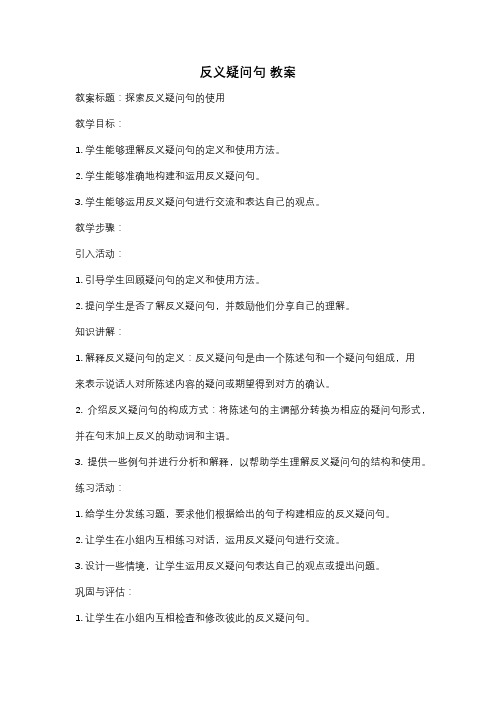
反义疑问句教案教案标题:探索反义疑问句的使用教学目标:1. 学生能够理解反义疑问句的定义和使用方法。
2. 学生能够准确地构建和运用反义疑问句。
3. 学生能够运用反义疑问句进行交流和表达自己的观点。
教学步骤:引入活动:1. 引导学生回顾疑问句的定义和使用方法。
2. 提问学生是否了解反义疑问句,并鼓励他们分享自己的理解。
知识讲解:1. 解释反义疑问句的定义:反义疑问句是由一个陈述句和一个疑问句组成,用来表示说话人对所陈述内容的疑问或期望得到对方的确认。
2. 介绍反义疑问句的构成方式:将陈述句的主谓部分转换为相应的疑问句形式,并在句末加上反义的助动词和主语。
3. 提供一些例句并进行分析和解释,以帮助学生理解反义疑问句的结构和使用。
练习活动:1. 给学生分发练习题,要求他们根据给出的句子构建相应的反义疑问句。
2. 让学生在小组内互相练习对话,运用反义疑问句进行交流。
3. 设计一些情境,让学生运用反义疑问句表达自己的观点或提出问题。
巩固与评估:1. 让学生在小组内互相检查和修改彼此的反义疑问句。
2. 提供一些情境,让学生口头或书面表达相关的反义疑问句。
3. 给学生布置作业,要求他们用反义疑问句写一篇小短文,描述自己的某个经历或观点。
拓展活动:1. 鼓励学生在日常交流中积极运用反义疑问句,加强对该语法结构的掌握。
2. 提供更复杂的句子和情境,让学生挑战更高难度的反义疑问句构建和运用。
教学资源:1. 反义疑问句的定义和例句。
2. 练习题和答案。
3. 小组讨论和交流的活动材料。
4. 作业布置和评估表。
教学评估:1. 观察学生在课堂上的参与程度和理解能力。
2. 检查学生完成的练习题和作业。
3. 评估学生在口头和书面表达中运用反义疑问句的准确性和流利度。
教学反思:1. 根据学生的反馈和评估结果,对教学内容进行调整和优化。
2. 鼓励学生在日常生活中多运用反义疑问句,以加深对该语法结构的理解和掌握。
反义疑问句教案

Activity sheet目标(learning aims):1.认识反意疑问句2.分析并理解反意疑问句的结构3.学习特殊的反意疑问句的疑问方式难点(difficulty):反意疑问句的结构Activity one: introduction反意疑问句又称附加疑问句,在一个陈述句之后附上一个简短的疑问句,对陈述句提出相反的疑问,这种疑问句叫反意疑问句。
Activity two: new lessonStep1: watch and think1. He isn’t talking, is h e?2. We speak Chinese, don’t we?Work out the rule: 反意疑问句中,前面陈述句的时态和后面的时态,前面主语的人称和后面主语的人称,前面的陈述句是肯定形式,后面的疑问句为形式,前面为否定形式,则后面为形式。
Step 2: analysis疑问句部分动词的使用要根据陈述句而定观察—————讨论—————练习1.动词为be 例句:He is a student, isn’ he?1. You are an actor, _____ _______?2. She is going to visit me, _______ ____?3. It wasn’t fine yesterday, ________?2.动词是行为动词(实意动词)例句:She likes music, doesn’t she?1. It often rains here, _______ ____?2. You have a headache, ___ _____?3. I called you yesterday, ___ ____?4. It doesn’t rain here, ______ ?5. You didn’t call me yesterday, ______?3.动词是情态动词或助动词They can’t speak English, can they?You will go to Nanjing, won’t you?1. You will go to America, ___________?2. We have ever been to Shanghai, ________?3. He hasn’t done his homework, _________?4. You should try your best, ____________?Step 3: extend1.陈述部分如有表示否定意思的某些词,never, seldom, hardly, few, little, nobody, no, no one, nothing, too…to…, 疑问部分须用肯定.试一试:1. He never watches TV, ___ ____?2.They have very few friends here, ___ __?3.There is nothing in it, ___ __?2. 如果陈述部分是带有否定前缀un-, dis-, im- 或后缀-less时, 后面问句用否定形式.试一试:She is unhappy, _________?巩固练习1. There is no air on the moon, __ __ _ ___?2. He made few mistakes, ___ __ ___ _?3. Mary can speak little English, __ __ __ __?4. It is impossible, __ __ ___ __?5. You dislike swimming, __ __ _ __?6. She is unhappy, __ ___ _ ___?特殊句型在祈使句的反义疑问句后统一用will you? 当祈使句以let’s 开头时,疑问句用shall we。
小学英语反意疑问句教案
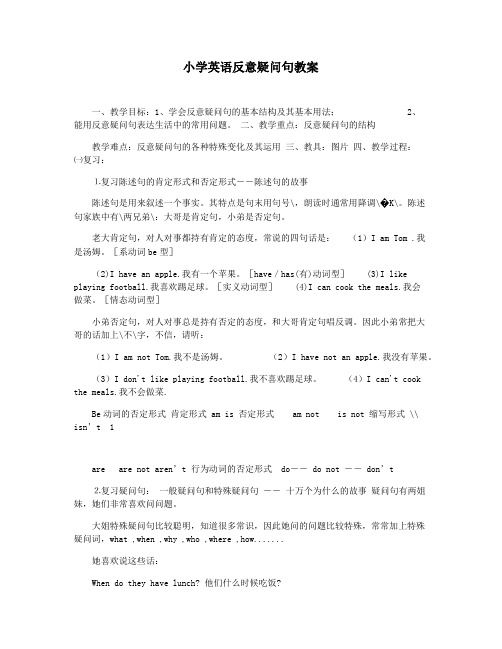
小学英语反意疑问句教案一、教学目标:1、学会反意疑问句的基本结构及其基本用法; 2、能用反意疑问句表达生活中的常用问题。
二、教学重点:反意疑问句的结构教学难点:反意疑问句的各种特殊变化及其运用三、教具:图片四、教学过程:㈠复习:⒈复习陈述句的肯定形式和否定形式――陈述句的故事陈述句是用来叙述一个事实。
其特点是句末用句号\,朗读时通常用降调\�K\。
陈述句家族中有\两兄弟\:大哥是肯定句,小弟是否定句。
老大肯定句,对人对事都持有肯定的态度,常说的四句话是:(1)I am Tom .我是汤姆。
[系动词be型](2)I have an apple.我有一个苹果。
[have/has(有)动词型] (3)I like playing football.我喜欢踢足球。
[实义动词型] (4)I can cook the meals.我会做菜。
[情态动词型]小弟否定句,对人对事总是持有否定的态度,和大哥肯定句唱反调。
因此小弟常把大哥的话加上\不\字,不信,请听:(1)I am not Tom.我不是汤姆。
(2)I have not an apple.我没有苹果。
(3)I don't like playing football.我不喜欢踢足球。
(4)I can't cook the meals.我不会做菜.Be动词的否定形式肯定形式 am is 否定形式 am not is not 缩写形式 \\ isn’t 1are are not aren’t 行为动词的否定形式do――do not ―― don’t⒉复习疑问句:一般疑问句和特殊疑问句―― 十万个为什么的故事疑问句有两姐妹,她们非常喜欢问问题。
大姐特殊疑问句比较聪明,知道很多常识,因此她问的问题比较特殊,常常加上特殊疑问词,what ,when ,why ,who ,where ,how.......她喜欢说这些话:When do they have lunch? 他们什么时候吃饭?Where does he do his homework? 他在那里做作业? How is your father? 你爸爸怎么样了?二妹一般疑问句比较笨,一般的问题都不知道,所以常常问这些问题: Is this an apple? [be 型] Are you Lucy?Do you go to school by bus ?[助动词型]后来,疑问句家庭又生了个小妹妹,你记得她是谁吗?她叫做“反意疑问句”。
反义疑问句(教案)
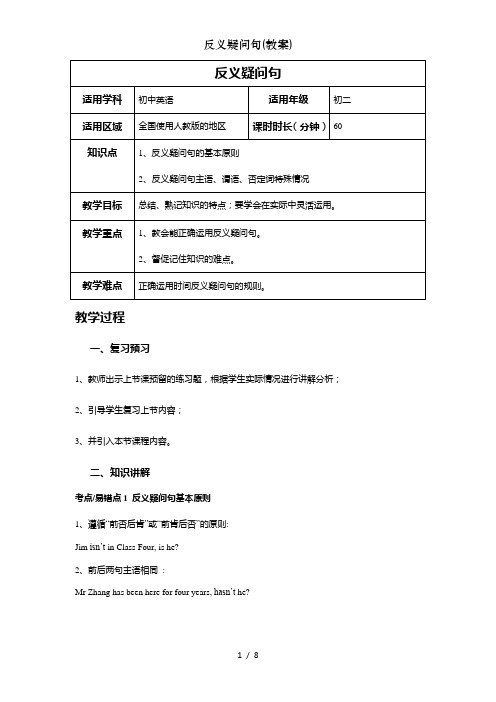
教学过程一、复习预习1、教师出示上节课预留的练习题,根据学生实际情况进行讲解分析;2、引导学生复习上节内容;3、并引入本节课程内容。
二、知识讲解考点/易错点1 反义疑问句基本原则1、遵循“前否后肯”或“前肯后否”的原则:Jim isn’t in Class Four, is he?2、前后两句主语相同:Mr Zhang has been here for four years, hasn’t he?考点/易错点2 主语选用的特殊情况考点/易错点3 谓语选用特殊情况考点/易错点4 否定词的特殊情况句中有seldom, hardly, no, not, never, few, little, nothing, nobody, nowhere等是否定句,疑问部分必须采用肯定形式:Nobody phoned while I was out, did they?He is hardly able to swim, is he?There is little ink in your pen, is there?三、例题精析【1】I am right , ____________ ?答案:aren’t I【2】They can hardly believe it,________ ___________ ?答案:can they,他们很难相信(这件事),是吗?【3】Give me some money, _________ ____________?答案:will you,给我一些钱,好吗?四、课堂运用【基础】一、填空1.It’s very hot today, _______________ ?2. He can speak Chinese, _______________ ?3. Meimei studies in a middle school, _______________ ?4. He never gets up late , _______________ ?5. Don’t go out at night, _______________ ?【巩固】二、填空1.Everything starts to grow in spring, _______________ ?2.He can hardly finish his homework, _______________ ?3.I’m in Class 3,Grade 2, _______________ ?4.Let’s go shopping , _______________ ?5.She doesn’t like climbing hills , _______________ ?【拔高】三、单项选择1. Linda ate nothing this morning, ___?A. didn’t sheB. was sheC. did sheD. wasn’t she2. There’s hardly___ milk in the bottle, _____there?A. no, isn’tB. some, isC. little, isn’tD. any, is3. He has never ridden a horse before, ___?A. does heB. has heC. hasn’t heD. doesn’t he4. — He seldom came here, _____?— Yes sir.A. didn’t heB. does heC. doesn’t heD. d id he5. Everything seems all right, _____ ?A. does itB. don’t theyC. won’t itD. doesn’t it7. One can’t be too modest, can _____ ?A. oneB. heC. itD. we8. No one failed in the exam, _____ ?A. was heB. did oneC. did theyD. didn’t he10. Neither you nor I am a artist, _____ ?A. am IB. aren’t weC. are weD. amn’t I答案:一、1 . isn’t it 2. can’t he 3.doesn’t she 4.does he 5.will you二、1.doesn’t it 2.can he 3 .aren’t I 4.shall we 5.does she三、1—5 CDBDD 6—10 BACDC课程小结这节课我们主要学习了反义疑问句相关知识。
反义疑问句课程设计

反义疑问句课程设计一、课程目标知识目标:1. 学生能理解反义疑问句的概念和结构,掌握其基本构成法则。
2. 学生能够识别并运用常见的反义疑问句,如助动词、情态动词和Be动词构成的疑问句。
3. 学生能够掌握反义疑问句在口语交流中的应用,了解其表达的交际功能。
技能目标:1. 学生能够正确构造反义疑问句,做到语法准确、用词恰当。
2. 学生能够在实际情境中灵活运用反义疑问句进行提问和回答,提高口语表达能力。
3. 学生能够通过小组讨论、角色扮演等形式,锻炼反义疑问句在实际交流中的运用能力。
情感态度价值观目标:1. 学生在学习反义疑问句的过程中,培养对英语语法学习的兴趣和热情。
2. 学生能够主动参与课堂活动,积极与同学互动,提高合作意识和团队精神。
3. 学生通过学习反义疑问句,增强自信心,敢于在口语交流中表达自己的观点和想法。
分析课程性质、学生特点和教学要求,本课程旨在帮助学生在掌握反义疑问句知识的基础上,提高口语表达能力,培养学生积极主动参与交流的态度,从而提高英语综合运用能力。
课程目标分解为具体学习成果,以便后续教学设计和评估。
二、教学内容本章节教学内容依据课程目标,紧密结合教材,确保科学性和系统性。
以下是详细的教学大纲及内容安排:1. 引入反义疑问句的概念和结构,讲解其基本构成法则。
- 教材章节:第二章第五节- 内容列举:助动词、情态动词和Be动词构成的反义疑问句2. 通过实例分析,让学生掌握反义疑问句的用法和语境。
- 教材章节:第二章第五节- 内容列举:肯定句与否定句的转换,反义疑问句的提问和回答技巧3. 实践活动:小组讨论,角色扮演,练习构造和应用反义疑问句。
- 教材章节:第二章第五节、第六节- 内容列举:日常交流场景模拟,如购物、问路等,运用反义疑问句进行提问和回答4. 课堂互动:学生互相提问,教师点评并纠正错误,巩固所学知识。
- 教材章节:第二章第五节至第六节- 内容列举:课堂问答,小组竞赛,总结反义疑问句的用法和注意事项5. 课后作业:布置相关练习,巩固反义疑问句知识,提高学生运用能力。
反义疑问句(教案)
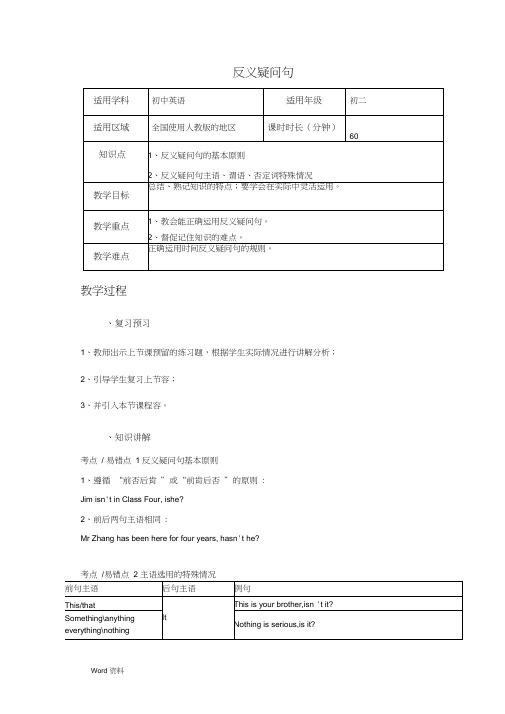
表示告诉别人做某事的
祈使句
will you、can you、would you can't you、
won't you:
Stop talking, can you?
Write down the new words, will you / won't you?
考点/易错点4否定词的特殊情况
句中有seldom, hardly, no, not, never, few, little, nothing, nobody, nowhere等是否定句,疑问 部分必须采用肯定形式:
Nobody phoned while Iwas out, did they?
He is hardly able to swim, is he?
must(应该)
用mustn't
I must study hard, mustn't I?
mustn't
用must或may
You mustn't talk like that, must you?
实义动need和dear
用do
He needs help, doesn't he?
情态动need和dear
词原形 ”
“ought to +动词原形 ”
用oughtn't或shouldn't
We ought to go there, shouldn't we?
“used to +
动词原形 ”
didn't +主语 ”usedn't主语 ”
He used to live in London, usedn't he / didn't he?
反义疑问句教案

反义疑问句语法课目标(learning aims):1.认识反意疑问句2.分析并理解反意疑问句的结构3.学习特殊的反意疑问句的疑问方式难点(difficulty):反意疑问句的结构;前否后肯形式的反义疑问句的回答。
一课前预习(自主预习):阅读课本172页,接触反义疑问句。
二课内探究:(一)自主学习Activity one: introduction反意疑问句又称附加疑问句,在一个陈述句之后附上一个简短的疑问句,对陈述句提出相反的疑问,这种疑问句叫反意疑问句。
结构:助动词/系动词be(肯定或否定)+主语(代词)Activity two: new lessonStep1: watch and think1. He isn’t talking, is he?2. We speak Chinese, don’t we?Work out the rule:1,反意疑问句中,前面陈述句的时态和后面的时态2,前面主语的人称和后面主语的人称3,前面的陈述句是肯定形式,后面的疑问句为形式,前面为否定形式,则后面为形式。
(二)精讲点拨(小组互助合作)Step 2: analysis疑问句部分动词的使用要根据陈述句而定观察—————讨论—————练习1.动词为be 例句:He is a student, isn’ he?1. You are an actor, _____ _______?2. She is going to visit me, _______ ____?3. It wasn’t fine yesterday, ________?2.动词是行为动词(实意动词)例句:She likes music, doesn’t she?1. It often rains here, _______ ____?2. You have a headache, ___ _____?3. I called you yesterday, ___ ____?4. It doesn’t rain here, ______ ?5. You didn’t call me yeste rday, ___ ___?3.动词是情态动词或助动词They can’t speak English, can they?You will go to Nanjing, won’t you?1. You will go to America, ___________?2. We have ever been to Shanghai, ________?3. He hasn’t done his homework, _________?4. You should try your best, ____________?Step 3: extend1.陈述部分如有表示否定意思的某些词,never, seldom, hardly, few, little, nobody, no, no one, nothing, too…to…, 疑问部分须用肯定.试一试:1.He never watches TV, ___ ____?2.They have very few friends here, ___ __?3.There is nothing in it, ___ __?2.如果陈述部分是带有否定前缀un-, dis-, im- 或后缀-less时, 后面问句用否定形式.试一试:She is unhappy, _________?在回答反义疑问句时,要特别注意英、汉两种语言习惯的差别。
反义疑问句教案

反义疑问句教案教案标题:反义疑问句教案教案目标:1. 学生能够理解反义疑问句的定义和用法。
2. 学生能够正确构造反义疑问句。
3. 学生能够运用反义疑问句进行交流和表达。
教学资源:1. PowerPoint演示文稿。
2. 反义疑问句练习题。
3. 黑板/白板和彩色粉笔/白板笔。
教学步骤:引入:1. 使用幻灯片展示一些常见的反义疑问句,如:"You are a student, aren't you?" "She can speak English, can't she?"2. 引导学生观察这些句子的结构和用法,并解释反义疑问句的定义。
讲解:1. 解释反义疑问句的结构:主句和附加问句。
2. 解释附加问句的构成:与主句的形式相反的助动词/情态动词 + 主语。
3. 强调附加问句的语调:如果主句是肯定句,附加问句使用否定形式;如果主句是否定句,附加问句使用肯定形式。
示范:1. 在黑板/白板上写下一个肯定句,如:"He likes ice cream."2. 解释如何构造附加问句:"He likes ice cream, doesn't he?"3. 强调附加问句的语调。
练习:1. 分发练习题给学生,让他们根据给定的句子构造相应的反义疑问句。
2. 鼓励学生互相交流和讨论答案。
3. 随机选择学生回答问题,并给予积极的反馈和纠正。
巩固:1. 继续使用练习题进行巩固练习,让学生更加熟悉反义疑问句的构造和用法。
2. 提供额外的练习题或情境对话,让学生在实际交流中运用反义疑问句。
总结:1. 回顾反义疑问句的定义和用法。
2. 强调学生在日常交流中积极运用反义疑问句。
3. 解答学生可能有的疑问和困惑。
拓展活动:1. 让学生在小组中编写对话,使用反义疑问句进行交流。
2. 鼓励学生在写作中使用反义疑问句,提高语言表达的准确性和流畅性。
反意疑问句经典讲解教案

反意疑问句经典讲解教案讲义一、英文中的反意疑问句。
1、什么是反意疑问句英语中,反意疑问句是由陈述句和附在其后的附加疑问句组成。
其中附加疑问句是对陈述句所说的事实或观点提出疑问,起证实作用,一般用于证实说话者所说的事实或观点。
翻译为“是吗”2.反意疑问句的回答,回答时,如果情况属实,用Y es加上反问句的倒装肯定句;若果情况不属实,则用No加上反问句的倒装否定句。
例如Y ou were moved by your students, weren’t you?情况属实:Y es, I were.情况不属实:No, I weren’t.二、反意疑问句中问句部分的动词与陈述部分的动词在语气上成相反的对应关系,即:肯定+否定?否定+肯定?如:①Y ou can’t do it, can you?你不能做它,是吗?②They are very late for the meeting, aren’t they?他们开会迟到了,是吗?三.当陈述句中含有be动词,助动词,或是情态动词时,反问句部分由这些词加上主语人称代词构成,Be动词包括:am, is, are, was, were助动词有:do, does, did, have(用在完成时), has(用在完成时)等情态动词有:can, could, may, might, must, will, would, shall, should例如:She is a lovely girl, isn’t she?她是一个可爱的女孩,是吗?He will go home, __won’t__ __he__?他要回家了,是吗?She doesn’t l ike to eat popcorn, __does__ _she___?她不喜欢吃爆米花,是吗?The baby won’t sleep early, will it?小宝宝睡得不早,是吗?注意:①He has supper at home every day,doesn’t’t he? (不能用hasn’t he?)他每天在家吃晚饭,是吗?②They have known the matter, haven’t they? (不能用don’t they?)他们已经知道那事情了,是吗?四.当陈述句中只含有行为动词时,若动词加了s,就用does, 若动词为原形,就用do,动词为过去式,则用did,例如:Y ou cleaned your house last week, _didn’t___ __you__?你上周打扫了你的房间,是吗?Y our father plays the computer very well, __doesn’t__ ___he _?你父亲电脑技术很好,是吗?They loo k so happy today, _don’t ___ _they___?你今天看起来很高兴,是吗?五.反意疑问句的陈述部分带有little, few, never, hardly, seldom,nobody, nothing, barely, scarcely等否定意义的词时,问句部分用肯定式。
反意疑问句最终教案
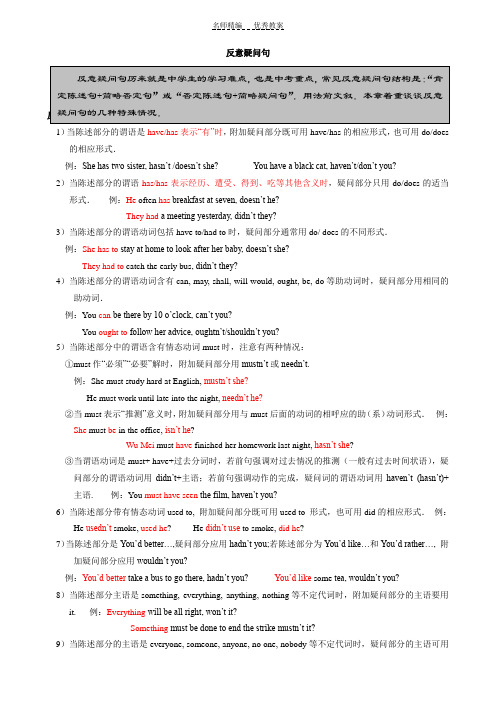
反意疑问句1)当陈述部分的谓语是have/has表示“有”时,附加疑问部分既可用have/has的相应形式,也可用do/does 的相应形式.例:She has two sister, hasn’t /doesn’t she?You have a black cat, haven’t/don’t you?2)当陈述部分的谓语has/has表示经历、遭受、得到、吃等其他含义时,疑问部分只用do/does的适当形式.例:He often has breakfast at seven, doesn’t he?They had a meeting yesterday, didn’t they?3)当陈述部分的谓语动词包括have to/had to时,疑问部分通常用do/ does的不同形式.例:She has to stay at home to look after her baby, doesn’t she?They had to catch the early bus, didn’t they?4)当陈述部分的谓语动词含有can, may, shall, will would, ought, be, do等助动词时,疑问部分用相同的助动词.例:You can be there by 10 o’clock, can’t you?You ought to follow her advice, oughtn’t/shouldn’t you?5)当陈述部分中的谓语含有情态动词must时,注意有两种情况:①must作“必须”“必要”解时,附加疑问部分用mustn’t或needn’t.例:She must study hard at English, mustn’t she?He must work until late into the night, needn’t he?②当must表示“推测”意义时,附加疑问部分用与must后面的动词的相呼应的助(系)动词形式.例:She must be in the office, isn’t he?Wu Mei must have finished her homework last night, hasn’t she?③当谓语动词是must+ have+过去分词时,若前句强调对过去情况的推测(一般有过去时间状语),疑问部分的谓语动词用didn’t+主语;若前句强调动作的完成,疑问词的谓语动词用haven’t (hasn’t)+主语. 例:You must have seen the film, haven’t you?6)当陈述部分带有情态动词used to, 附加疑问部分既可用used to 形式,也可用did的相应形式.例:He usedn’t smoke, used he? He didn’t use to smoke, did he?7)当陈述部分是You’d better…,疑问部分应用hadn’t you;若陈述部分为You’d like…和You’d rather…, 附加疑问部分应用wouldn’t you?例:You’d better take a bus to go there, hadn’t you?You’d like some tea, wouldn’t you?8)当陈述部分主语是something, everything, anything, nothing等不定代词时,附加疑问部分的主语要用it. 例:Everything will be all right, won’t it?Something must be done to end the strike mustn’t it?9)当陈述部分的主语是everyone, someone, anyone, no one, nobody等不定代词时,疑问部分的主语可用he,也可用they. 例:No one wants to do it, doesn’t he / don’t they?Neither of the answers is right, aren’t they?10)当陈述部分带有seldom, hardly, never, few, little, nothing, nobody等否定词时,疑问部分宜用肯定式.例:She seldom goes to school late, does she?Few people know him, do they?11)当陈述部分中有否定前缀或后缀的否定词时,疑问部分仍用否定式.例:She dislikes her boyfriend, doesn’t she?She is careless in writing, isn’t she?12)在“祈使句+疑问部分”构成的反意疑问句中,疑问部分常用will you/won’t you/ wouldn’t you?例:Close the window, please, will you? Come tomorrow evening, won’t you?13)当陈述部分以Let’s...开头,疑问部分用shall we?但以“Let us…”开头的,附加疑问部分常用will you?例:Let’s have a cup of Chinese tea, shall we?Let us go to the supermarket, will you?14)当陈述部分是感叹句,附加疑问部分则用否定式,且主语和感叹句主语要一致.例:What a lovely day, isn’t it?What a good man, isn’t he?15)陈述部分为I am...时,疑问部分用aren’t.例:I am late, aren’t I ?I am a teacher, aren’t I ?16)当陈述部分为I wish...时,疑问部分则用may I ?例:I wish to go to Hefei to see you one day, may I ?I wish to use your pen, may I ?17)当陈述部分是带有宾语从句的主从结构,疑问部分的助动词和主语应与主句的主谓要一致,但当句中部分是I think.../I suppose…/I believe...等结构时,疑问部分助动词主语则与that从句中的主、谓保持一致.例:They said that I was right, didn’t th ey? I don’t think you have done it, have you?18)当陈述部分含有状语从句时,附加疑问部分的主语、谓语应与主句的主、谓语一致.例:When I got to school, the classes had already begun, hadn’t they?When the teacher speaks, we have to keep quiet, don’t we?反意疑问句的回答反意疑问句回答根据事实,前后一致.1. You’ve heard from him , haven’t you ?Yes, I have. 是的。
- 1、下载文档前请自行甄别文档内容的完整性,平台不提供额外的编辑、内容补充、找答案等附加服务。
- 2、"仅部分预览"的文档,不可在线预览部分如存在完整性等问题,可反馈申请退款(可完整预览的文档不适用该条件!)。
- 3、如文档侵犯您的权益,请联系客服反馈,我们会尽快为您处理(人工客服工作时间:9:00-18:30)。
小学英语反意疑问句教案一、教学目标:1、学会反意疑问句的基本结构及其基本用法;2、能用反意疑问句表达生活中的常用问题。
二、教学重点:反意疑问句的结构教学难点:反意疑问句的各种特殊变化及其运用三、教具:图片四、教学过程:㈠复习:⒈复习陈述句的肯定形式和否定形式——陈述句的故事陈述句是用来叙述一个事实。
其特点是句末用句号".",朗读时通常用降调"↘"。
陈述句家族中有"两兄弟":大哥是肯定句,小弟是否定句。
老大肯定句,对人对事都持有肯定的态度,常说的四句话是:(1)I am Tom .我是汤姆。
[系动词be型](2)I have an apple.我有一个苹果。
[have/has(有)动词型](3)I like playing football.我喜欢踢足球。
[实义动词型](4)I can cook the meals.我会做菜。
[情态动词型]小弟否定句,对人对事总是持有否定的态度,和大哥肯定句唱反调。
因此小弟常把大哥的话加上"不"字,不信,请听:(1)I am not Tom.我不是汤姆。
(2)I have not an apple.我没有苹果。
(3)I don't like playing football.我不喜欢踢足球。
(4)I can't cook the meals.我不会做菜.Be动词的否定形式肯定形式否定形式缩写形式am am not \is is not isn’tare are not aren’t行为动词的否定形式 do—— do not —— don’t⒉复习疑问句:一般疑问句和特殊疑问句——十万个为什么的故事疑问句有两姐妹,她们非常喜欢问问题。
大姐特殊疑问句比较聪明,知道很多常识,因此她问的问题比较特殊,常常加上特殊疑问词,what ,when ,why ,who ,where ,how.......她喜欢说这些话:When do they have lunch? 他们什么时候吃饭?Where does he do his homework? 他在那里做作业?How is your father? 你爸爸怎么样了?二妹一般疑问句比较笨,一般的问题都不知道,所以常常问这些问题:Is this an apple? [be 型]Are you Lucy?Do you go to school by bus ?[助动词型]后来,疑问句家庭又生了个小妹妹,你记得她是谁吗?她叫做“反意疑问句”。
下面我们一起来重新认识下她!2、反意疑问句的定义——“反意疑问句就是我,我就是反意疑问句”我是谁呢?反义疑问句又叫做附加疑问句,是指当提问的人对前面所叙述的事实不敢肯定,需要想对方以及证实时所提出的问句。
它是疑问句的一种,常用来征求对方的看法,形式上是一个省略问句,附加在陈述句后,两部分的人称时态应保持一致。
简单地说,我就是个“半懂半不懂的问题孩子”(肯定一半,否定一半)。
Eg.She is a lovely girl ,isn’t she?She isn’t a lovely girl,is she?He will go home, won’t he?He won’t go home,will he ?想一想,你发现什么规律了?3、反意疑问句的结构——“前肯后否,前否后肯”1.肯定式陈述部分+否定式疑问部分They work hare, don’t they?She was ill yesterday, wasn’t she?2.否定式陈述部分+肯定式疑问部分You didn’t go, did you?He can’t ride a bike, can he?注意动词前后保持一致,人称不变。
★总结1:前肯后否,前否后肯,前陈后疑。
练一练:(1)He often goes to work by bus, ________________?(2)Uncle Wand can make different kinds of kites, _________________?(3)Peter wasn’t late for school this morning, ____________________?(4)They were at home last night, ___________________?(5)His aunt bought a new car, __________________?(6)Mr. Li didn’t have a meeting last week, __________________?注意:当主语为名词,人名时,反义疑问句的主语必须用人称代词来代替。
Your brother’s gone to the library, hasn’t he ?Mary is working hard, isn’t she ?★总结2:Be、助、情,直接加人称:陈述句中如果有Be动词、助动词、情态动词时,疑问部分就由这些词加上主语人称代词;★总结3:三变三,过变过:如果陈述句动词是第三人称单数(-s)时,疑问部分就由does\doesn’t+人称代词;如果陈述句动词是一般过去式,疑问部分就did\didn’t+人称代词.★反意疑问句常见的八种特殊情况——我有八个变身哦!1、陈述句为there be+主语+其他结构时,反义疑问句部分要用“be(not)+there”结构There are some bananas in the basket, aren’t there?练一练:(图片展示,one by one造句)2、表示否定意义的词:Little few never hardly seldom nobody nothing scarcely当陈述句有表示否定意义的词时,疑问部分用肯定式。
Eg:She never tells a lie,does she?He was seldom late,was he?3、陈述句中含有un-, im-, in-, dis-等词缀构成的否定词语时,陈述部分视为肯定,反义疑问句要用否定形式。
Your father is unhappy, isn’t he?It is impossible to learn English without remembering more words, isn’t it?The man is dishonest, isn’t he?练一练:(图片展示,one by one造句)4、陈述部分是祈使句时,疑问部分用will you。
如:Don't be late next time, will you? 下次不要迟到了,好吗?Come here, will you / won't you? 到这儿来,好吗?注意: Let's 开头的祈使句,疑问部分用shall we, Let us 开头的祈使句,疑问部分用will you。
如:Let's start with the song, shall we? 咱们以这首歌开始,好吗?Let us help you, will you? 让我帮助你,好吗?练一练:(1)Don’t read in the sun ,_____________?(2)Drink some water ,____________________?(3)Let us go,____________________ ?(4)Let’t go,____________________ ?5、have作为“有”的意思时,反义疑问部分可以用have或是do的相对应形式You have a sister, do /have you?You don’t have an English dictionary, do you?She hasn’t a pen, has she?练一练:口头练习6、部分的主语是I,疑问部分要用 aren't I.I'm as tall as your sister,aren't I?7、陈述部分的谓语是wish,疑问部分要用may +主语。
I wish to have a word with you, may I?8、陈述句主语为this, that,反义疑问句用it代替,陈述句主语为these和those时,翻译疑问句用they代替That isn’t a useful book,is it?Here are important reading books, aren’t they?实战练习:1.Tom was happy, _________________?2.Tom was unhappy, _________________?3.Tom wasn’t happy, _________________?4.Tome likes watching TV, _________________?5.Tom dislikes watching TV, _________________?6.Tome doesn’t like watching TV, _________________?7.There are some birds singing in the tree, _________________?8.It seldom rains in Shenzhen, _________________?9.Cathy has little money, _________________?10.Christine hardly gets up early, _________________?11.Open the door, _________________?12.Don’t close the door, _________________?13.Let’s go to the supermarket, _________________?14.Let us go to the supermarket, _________________?15.They had lunch together, _________________?16.Jim is ill. Let’s go and see him after school, _________________?17.His father hardly knows English, _________________?18.He thinks his aunt is right, _________________?19.Linda has just come back from America, _________________?20.You will watch TV this evening, _________________?21.You like apples, _________________?22.Let’s go to Hong Kong, _________________?23.Something wrong has happed, _________________?24.They study a lot, _________________?25.Her daughter cleaned the carpets and curtains, _________________?26.The teacher had a talk with you, _________________?27.That’s the sort of the book you want, _________________?28.All these dictionaries are a great help to you, _________________?29.The movie was quite interesting, _________________?30.You will take a trip to America, _________________?31.There are some girls in the classroom, _________________?32.You had some trouble finding where I live, _________________?33.He has his hair cut every month, _________________?34.Your friend comes earlier, _________________?35.The little boy can not go to church, _________________?36.Susan would work abroad if she had the chance, _________________?37.Tell me how to operate the electronic computer, _________________?38.Mary comes to visit you on Christmas Day, _________________?39.Let’s listen to the radio program that the teacher mentioned, _______________?40.You’re funny, _________________?41.Janet took part in labor in that village, _________________?42.What beautiful weather, _________________?43.He will go to Kwangchow by plane, _________________?44.We never ask him a question, _________________?45.Let us do the exercises by ourselves, _________________?答案:1.wasn’t he2.wasn’t he3.was he4.doesn’t he5.doesn’t he 16.shall we17.does he18.doesn’t he19.hasn’t she20.won’t you31.aren’t there32.didn’t you33.doesn’t he34.doesn’t he35.can he6.does he7.aren’t there8.does it9.does she10.does he11.will you12.will you13.shall we14.will you15.didn’t they 21.don’t you22.shall we23.hasn’t it24.don’t they25.didn’t she26.didn’t she27.isn’t that28.aren’t they29.wasn’t it30.won’t you36.wouldn’t she37.will you38.doesn’t she39.shall we40.aren’t you41.didn’t she42.isn’t it43.won’t he44.do we45.will you。
